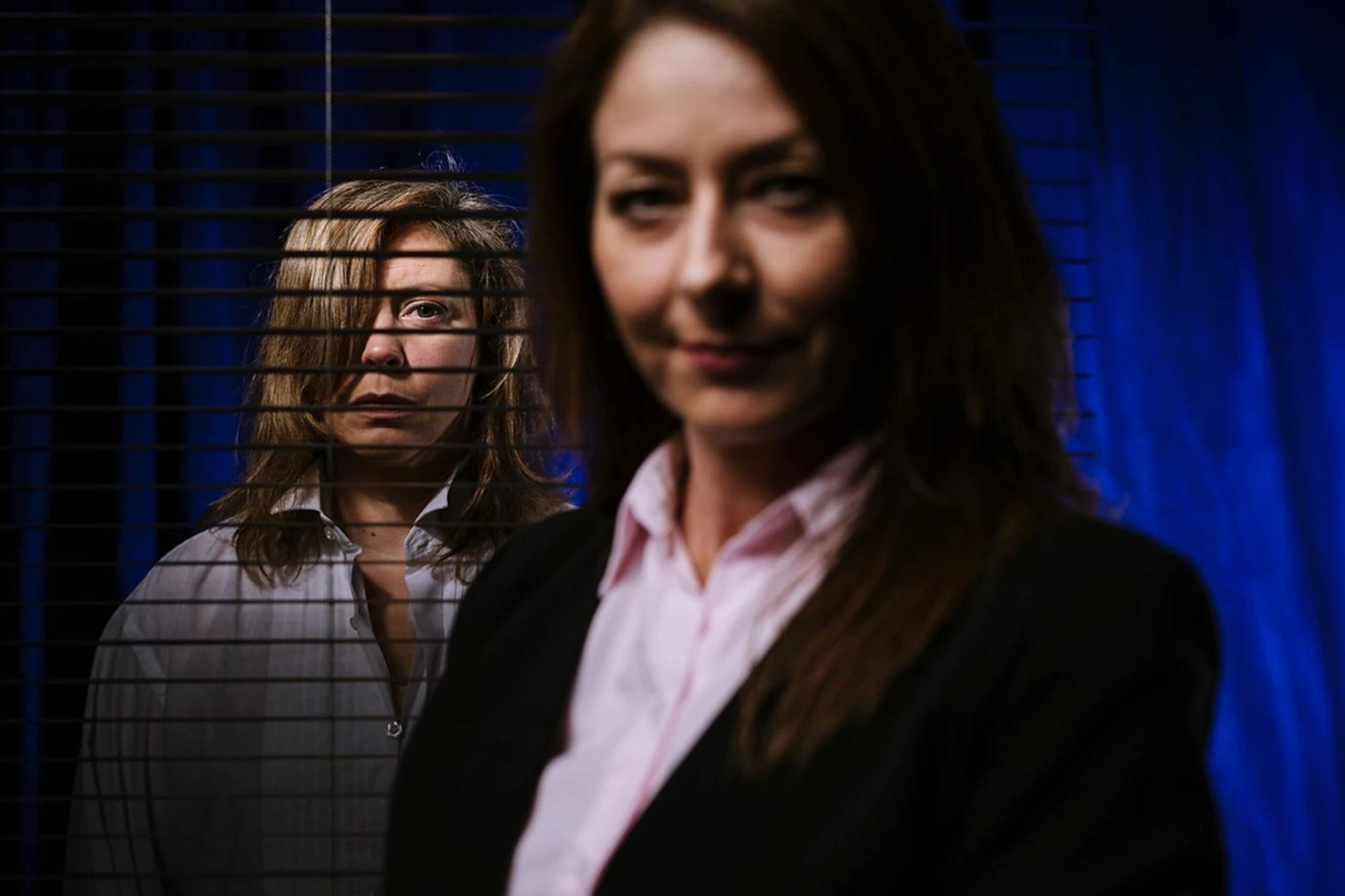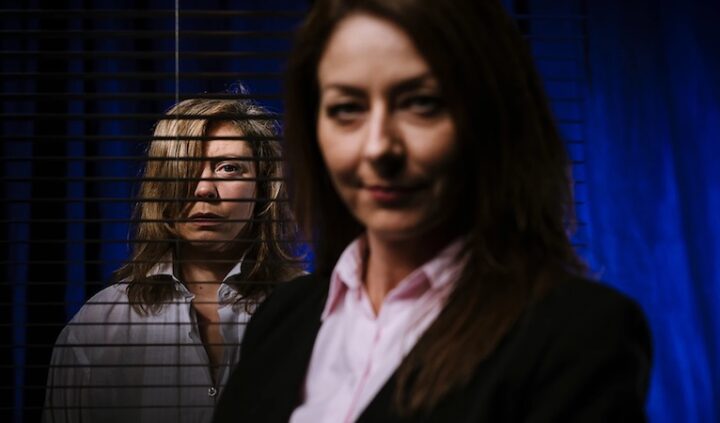What makes a “good victim”? Or a “bad” one?
These are some of the questions that led Melbourne playwright Sally Faraday to craft her latest theatrical production, The Long Game. Making its debut at Explosives Factory on June 28, The Long Game zones in on the politics that surrounds sexual assault allegations, power and credibility.
Ally Oliver-Perham, (Communications Manager, Victorian Women’s Trust) spoke with Sally, and one of the starring actors, Petra Glieson about their ambitions for this new work.
Note: this interview has been edited for clarity and brevity.
Ally: Sally, for people who are unfamiliar with The Long Game, what’s this play about?
Sally: The Long Game is about a pair of sisters in a political family (Esme and Miranda); one of whom is sexually assaulted when she’s quite young. Esme only tells her sister about it. Years later, when Miranda is a rising star in politics, she decides that she’s going to come forward with her own allegation. However, when she presents the details, it sounds very similar to what Esme had told her sister in confidence when they were young women.
And so it’s about feminism, sisterhood – if that exists still. It’s about sexual assault, Parliament, and the way victims are treated in the media, and the perceptions that exist still about women being complicit in their own assault.
It’s jam packed with questions, conflict, struggles and various resolutions for each of the women.
You’re bringing together some pretty heavy themes: politics, sexual assault, justice. Why was it important to bring these threads together?
Sally: The starting point was just as we were coming out of COVID, and there was all the talk about the Me Too Movement. I was seeing the way that people like Britney Higgins were being treated by the mainstream media, even some of those in the media who I would have considered to be quite enlightened about this stuff. I found myself asking, how do we talk about being a victim in the public arena? What are the perceptions that exist?
Another factor was a Women’s Safety Review in Parliament by the former Sex Discrimination Commissioner Kate Jenkins. I also watched Ms Represented, which was the Annabelle Crab documentary about Julia Gillard’s treatment during her tenure as the Prime Minister. Seeing the commentary around her, seeing it all laid out, it was very, very upsetting.
When I think of Julia, I’m amazed that she’s so together. I mean, I’m sure that she has her moments. But, after all the things she went through, and also as one of the most effective politicians we’ve ever had, the amount of legislation that she actually managed to pass, and the way she was denigrated publicly was very sad. That led me to think, what are we doing as a society? Why is this happening? And I suppose, I was pretty grumpy!
Ally: Well, anger can be an excellent fuel.
Sally: Yes.
Petra, you’re one of the starring characters in this play. Can you tell us a little bit about your character?
Petra: Sure. So I play one of the daughters, Esme, the older daughter, who’s been away from the family for a long time, because it was her that was assaulted when she was younger.
She’s a bit of a wild card who comes in and stirs up a whole lot of things that really are meant to sort of hold a mirror up to to her mother and her sister, and the sorts of games that they’re playing in their in their lives, in their political life, but also within the family construct as well. Esme becomes the voice of conscience throughout.
Sally wrote the piece so that a number of different voices can be heard across the generations. We’ve got conventional thoughts about people who have suffered assault and abuse, and then we’ve got some points of view that are more progressive and looking into consent.
Sounds fascinating. Sally, the play also explores feminist solidarity, and how it has an uneasy relationship with the kind of alpha male competitiveness we see, especially in political groups. What’s your angle on this?
Sally: Well, I think sometimes it’s a bit uncomfortable for people to kind of realise that women can be pretty competitive also. Like, we really want women to progress, there’s no doubt, but when it comes down to it, especially in politics, you have to play the game.
One of the things about me as a playwright, I’m very interested in asking questions, and sometimes I won’t answer them. The audience might feel a little frustrated, but I really love that conversation. I never want to tell the audience whether they’re right or wrong. I’m very interested in, well, what do you think?
Ally: Mmm. And so, Petra, The Long Game is obviously talking about justice. And what does that mean coming from an arts perspective? How does it further the conversation?
Petra: Well, I think it’s a great conduit. There’s an element of honesty in the way that we approach any performance or art, that hopefully can hold up an objective light.
Sometimes it can just get straight to a point and challenge people, their perceptions and get on board for change. If the change isn’t coming from the upper echelons of where it needs to come from, in terms of legislature and policy, then I think the arts come in from a place of being a voice for the people, and a voice for the voiceless as well. That’s a passion a lot of storymakers come to this work with.
We’ve also got a Q&A night as part of this show. We want to use the arts as an arena and a platform for safe and inclusive discussion, inviting people to explore that and take it further.
Ally: That Q&A you mentioned, happening on July 5, our executive director Mary Crooks AO is going to be speaking after that performance. Sally, can you tell me a little bit more about this special session and what you’re wanting to get out of it?
Sally: We really want to give a platform to people who are talking about these particular issues. At the moment, there’s been quite a spike in violence against women, a lot of deaths this year of women at the hands of intimate partners and general gender based violence. And that’s part of the conversation as well.
One of my ambitions for the play was, like Prima Facie for instance, was really instrumental in kind of getting people to think again about how the justice system doesn’t serve particularly victims of sexual assault. We’d like to be part of that conversation also, because I think that’s an important part of the theme — what was she wearing, and what part did she play in the whole thing? We want to unpack that.
There’s a lot of people working in that space who support victims who just say that reporting [sexual assault] is a very confrontational process for victims. It’s re-traumatising. Can we do something about this system? If we’re just part of that conversation, that would be fantastic. And let’s not let this drop, because something needs to change.
Ally: Well, I think it’s an admiral goal. And we’re just so excited to be part of it. We can’t wait to see it. Thank you both.
The Long Game will premiere on June 28 at Explosions Factory, running until July 13. On July 5, the Victorian Women’s Trust will be participating in a special Q&A presentation after the play, featuring Mary Crooks AO (Victorian Women’s Trust, Executive Director).

